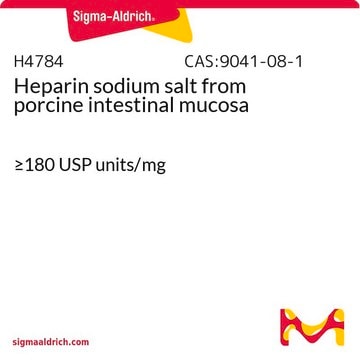D4776
De-N-sulfated heparin sodium salt
Completely de-N-sulfated and approx. 20% N-acetylated
Se connecterpour consulter vos tarifs contractuels et ceux de votre entreprise/organisme
About This Item
Produits recommandés
Source biologique
heparin from Porcine (mucosa)
Forme
solid
Température de stockage
2-8°C
Vous recherchez des produits similaires ? Visite Guide de comparaison des produits
Application
N-Acetylheparin, derivitized porcine mucosal heparin without anticoagulant properties, may be used to protect cardiac, vascular and neural tissues by inhibiting complement activation and neutrophil infiltration of the damage site.
Notes préparatoires
Prepared from porcine mucosal heparin by a modification of the method of Nagasawa, K. and Inoue, Y., Methods Carb. Chem., 8, 291 (1980).
Code de la classe de stockage
11 - Combustible Solids
Classe de danger pour l'eau (WGK)
WGK 3
Point d'éclair (°F)
Not applicable
Point d'éclair (°C)
Not applicable
Équipement de protection individuelle
Eyeshields, Gloves, type N95 (US)
Faites votre choix parmi les versions les plus récentes :
Déjà en possession de ce produit ?
Retrouvez la documentation relative aux produits que vous avez récemment achetés dans la Bibliothèque de documents.
J L Park et al.
Pharmacology, 58(3), 120-131 (1999-02-02)
The ability of the heparin derivative, N-acetylheparin (NHEP) to protect the heart from regional ischemia/reperfusion injury was examined in vivo. NHEP (2 mg/kg i.v.) or vehicle was administered 2 h before occlusion of the left circumflex coronary (LCX) artery. Open-chest
P C Kouretas et al.
Journal of molecular and cellular cardiology, 30(12), 2669-2682 (1999-02-17)
Heparin, which is widely used clinically, has recently been shown to have specific properties affecting the vascular endothelium. We hypothesized that heparin stimulates endothelial nitric oxide synthase (eNOS) activity by a mechanism independent of its anticoagulant properties and dependent on
P C Kouretas et al.
Circulation, 99(8), 1062-1068 (1999-03-02)
Coronary endothelial dysfunction after brief ischemia-reperfusion (IR) remains a clinical problem. We investigated the role of heparin and N-acetylheparin, a nonanticoagulant heparin derivative, in modulating coronary endothelial function after IR injury, with an emphasis on defining the role of the
Y Hua et al.
Journal of neurosurgery, 92(6), 1016-1022 (2000-06-06)
Brain edema formation following intracerebral hemorrhage (ICH) appears to be partly related to erythrocyte lysis and hemoglobin release. Erythrocyte lysis may be mediated by the complement cascade, which then triggers parenchymal injury. In this study the authors examine whether the
Notre équipe de scientifiques dispose d'une expérience dans tous les secteurs de la recherche, notamment en sciences de la vie, science des matériaux, synthèse chimique, chromatographie, analyse et dans de nombreux autres domaines..
Contacter notre Service technique








